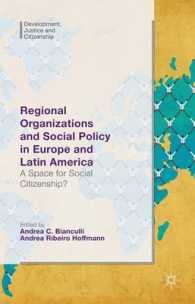- ホーム
- > 洋書
- > 英文書
- > Psychology
Full Description
This volume is an attempt to integrate the theory and data of social and personality development within a modem evolutionary framework. The various chapters are not meant to be read in isolation from one another but rather are intended to form an integrated whole. There is thus a great deal of cross-referencing between chapters and to some extent they all stand or fall together. This also suggests that the accuracy (or usefulness) of a particular chapter cannot be judged until the book is comprehended as a whole. Chapter 1 deals with the theoretical foundations of this enterprise, and the focus is on the compatibility of mainstream approaches within the field to a modem evolutionary approach. Chapters 2-4 concern what I view to be the fundamental proximal mechanisms underlying social and personality development. Chapter 2, on temperament and person ality development, is particularly central to the rest of the volume because these processes are repeatedly invoked as explanatory concepts at later points in the volume.
Contents
1. Theoretical Considerations.- I. Introduction.- II. Philosophical Issues and World Views.- III. General Theoretical Issues.- IV. Evolutionary Theory and the Theoretical Traditions of Social Development.- V. Theoretical Fragmentation or Integration?.- 2. Temperament and Personality Development.- I. Theories of Temperament.- II. Self-Regulation as Sensitivity to Rewards, with an Emphasis on the Positive Social Reward System: Evidence for a Third Personality Dimension.- III. Biological and Environmental Influences on Temperament.- IV. The Stability of Temperament.- V. Appendix.- 3. The Development of the Emotions.- I. Theories of Emotional Development.- II. Parent—Child Interaction as an Example of Emotional Processes in Development.- III. The Development of the Emotions.- 4. Social and Biological Events in Infancy and Their Relevance for Later Behavior.- I. Attachment in Evolutionary Perspective.- II. Aberrations in Attachment and Later Behavior.- 5. Parent—Child Relationships and the Transmission of Culture.- I. Global Parenting Styles.- II. The Family and the Socialization of Children in Evolutionary and Historical Perspective.- III. Centrifugal Tendencies within Families and Their Effects on Children.- IV. Affective Relationships within the Family and the Transmission of Culture.- V. General Effects of Decrements in Parental Investment and an Evolutionary Analysis of Parental Control.- VI. Appendix.- 6. Topics in the Development of Aggression, Peer Relations, and Sex Differences.- I. Issues in the Development of Aggression.- II. Issues in the Development of Peer Relations.- III. Sex Differences in Development.- 7. Moral and Altruistic Development I: The Roles of Cognition and Context.- I. The Cognitive-Developmental Approach to Moral Reasoning.- II. Rest'sComponent Model of Moral behavior.- III. A Review of the Literature on Moral Reasoning from the Perspective of Sociobiological Theory.- IV. Research on Norms Related to Altruism and Morality.- V. Reasoning about Altruistic Events.- VI. Summary and Conclusion.- 8. Moral and Altruistic Development II: The Importance of Socialization and Affect.- I. Descriptive Studies of Emotions and Their Role in Motivating Altruism.- II. Three Sociobiological Hypotheses.- III. Conclusion.- 9. Development in a Wider Context: Evolutionary Considerations.- I. Evolution and Ideology.- II. Socialization beyond the Family and Peer Systems.- III. Resource Availability as a Contextual Variable: Empirical Data.- IV. Conclusion and Integration.- References.







